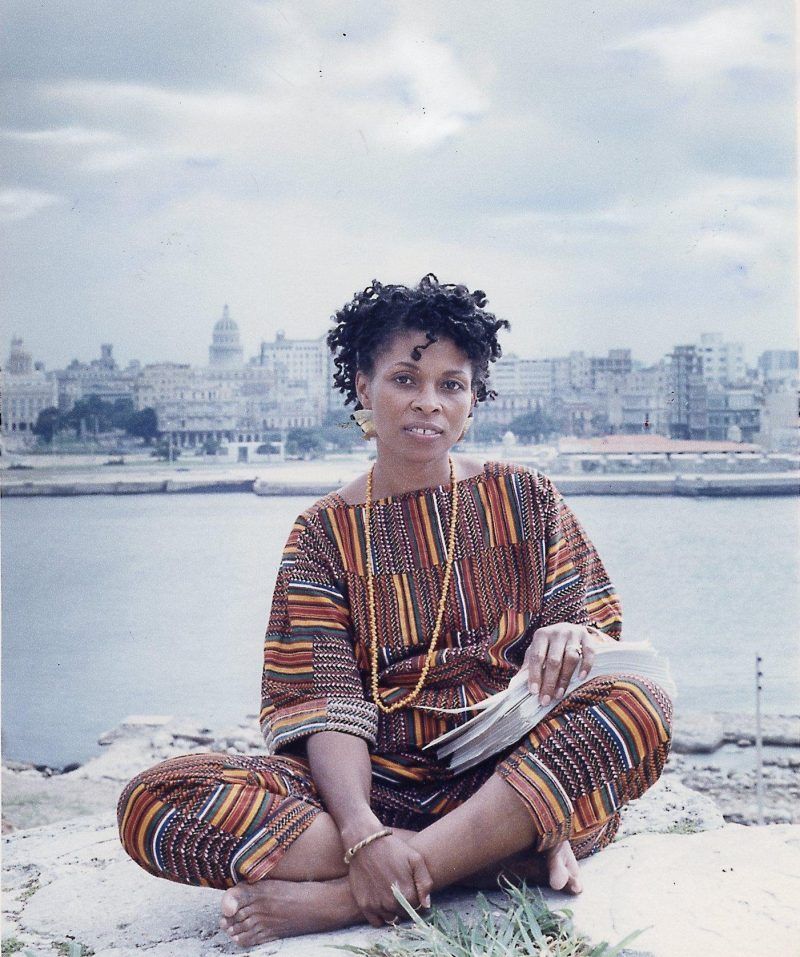
Source: Newsday LLC / Getty
“I come from a tradition of women maroons, Cimarrons who didn’t just try to escape from oppression but were totally mind, body, spirit committed to resisting and winning…”
Assata Shakur, Eyes of the Rainbow
“Maybe we are all running and hiding. Maybe we are running from something, all living a clandestine existence”
Assata Shakur, Assata
Assata Shakur liberated herself from prison three months after the first commemoration of Black August in 1979. Black August originated in San Quentin Correctional Facility to show solidarity with political prisoners and pay tribute to George Jackson, his brother Jonathan and Jeffrey Gaulden each who were killed in the month of August. As a result, Black August cannot be separated from its abolitionist and anti-capitalist origins. In Shakur’s autobiography ASSATA, she recalled learning of the Soledad Brothers and Jonathan Jackson after his death in 1970: “Seventeen years old and taking freedom into his own hands…Seventeen years old and dead…Who was Jonathan Jackson?”
On May 3, 1973, a wounded Shakur was arraigned in Superior Court of Middlesex County for the murder of two New Jersey state troopers, despite maintaining her innocence. While healing from her injuries she found strength in the words of other Black women in texts provided by the two Black nurses who cared for her: “when I read the book about Black women, i felt the spirits of those sisters feeding me, making me stronger.” Also a time for study, Black August provides the opportunity to illuminate the strength and wisdom in Shakur’s words, including her poetry as Dr. Joy James tells us “poetry and prose that please presidents eclipses the poetry of rebellion and political prisoners.”
Black Dreams
We ran. We fought.
[…]
We carried it on.
(from “THE TRADITION”, ASSATA)
In “The Tradition” Shakur offered a rich history of Black rebellion and resistance despite the most dire circumstances. An insistence of freedom as birthright and possibility—especially when the legacy of liberation is not only remembered but its dreams passed down and carried on. Each generation daring to have hope, to envision what dreams may come true or what dreams they make true. Assata’s grandmother, who was known to have prophetic dreams, traveled to prison to tell her she saw her impending freedom in a dream: “You’re coming home. I know what I’m talking about. Don’t ask me to explain it anymore, because I can’t.” A bone-deep knowing. Her grandmother also encouraged her not to get used to prison, “we don’t want you to get used to that place.” Freedom-fighter and liberator of her people, Harriet Tubman was believed to have prophetic dreams where routes for the Underground Railroad were revealed. Perhaps Assata’s most difficult and urgent dreams were the ones she had for her daughter, Kakuya, born while she was incarcerated: “this baby was our hope. Our hope for the future.”
And i can see a world
where you,
building and exploring,
strong and fulfilled,
will understand.
And go beyond
my little shabby dreams.
(from “TO MY DAUGHTER KAKUYA”, ASSATA)
Black Love
I believe in living.
I believe in birth.
I believe in the sweat of love
and the fire of truth.
(from “AFFIRMATION”, ASSATA)
Shakur’s writing and interviews reveal that she is guided by the love of her people—past, present, and future. The love she describes is not to be taken lightly, it is a source of freedom for all who experience it:
cause love is an acid
that eats away bars.
[…]
We are a conspiracy.
(from “LOVE”, ASSATA)
At its root, to conspire means the act of breathing together. To be in sync beyond words as revolutionary rhetoric alone is not enough—it is the value of our relationships that bring about lasting, transformative change. In a 1992 interview, Shakur stated “changing how we deal with each other and healing is a very important area of struggle.” She also acknowledged that love is often not without sacrifice adding “separation has been really hard on my family,” her mother harassed to the point of a heart attack. She was filming the documentary The Eyes of the Rainbow in Cuba, where she has been granted asylum since 1984, on the day she learned that her mother died, “I hope I can live up to my mother’s example. I hope I can live up to my ancestors’ expectations of me. I have a duty to all those that have come before me” she informed viewers. In an ode to her mother on the day of her passing, Shakur wrote “I promise to carry on.”
Black Freedom
It is our duty to fight for our freedom.
It is our duty to win.
We must love each other and support each other.
We have nothing to lose but our chains
(from an untitled passage, ASSATA)
These words are perhaps one of Shakur’s most well-known mantras, dedicated to the fallen soldiers in the fight for Black Freedom. “We must fight on” the passage instructs. Shakur’s autobiography details that she had been indicted on felony criminal charges six times, all of which were dismissed prior to trial or resulted in an acquittal, before the final conviction and life sentence in 1977. Shakur met Eva in prison who told her she could teach her Astral projection as she contended with non-freedom. When Shakur said she wanted her physical body to follow, Eva told her “you’ll be in jail no matter where you go”, that the chains will remain. Moments later, Shakur realized that we “don’t know what it feels like to be free. We aren’t free politically, economically, or socially.” Later, Eva tried to come to Shakur’s defense when under scrutiny by prison guards and likely was punished for it—the sadness and guilt compelled Shakur to write the following:
I saw your light
And it was shining.
[…]
They hate you momma
cause you expose their madness.
And their cruelty.
They can see in your eyes
a thousand nightmares
that they have made come true.
[…]
They call you mad.
And almost had you
believing that shit.
(from an untitled passage, ASSATA)
It is Eva who the state has determined is mad because she has refused to become maladjusted to such conditions, an embodied example in real-time of what it means to commit and fight for one’s freedom. Black August reminds us what it means to commit to Black Freedom because in the words of Shakur, “the only ones who can free us are ourselves.”


